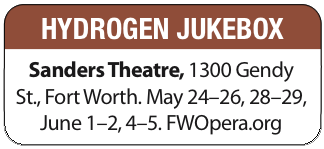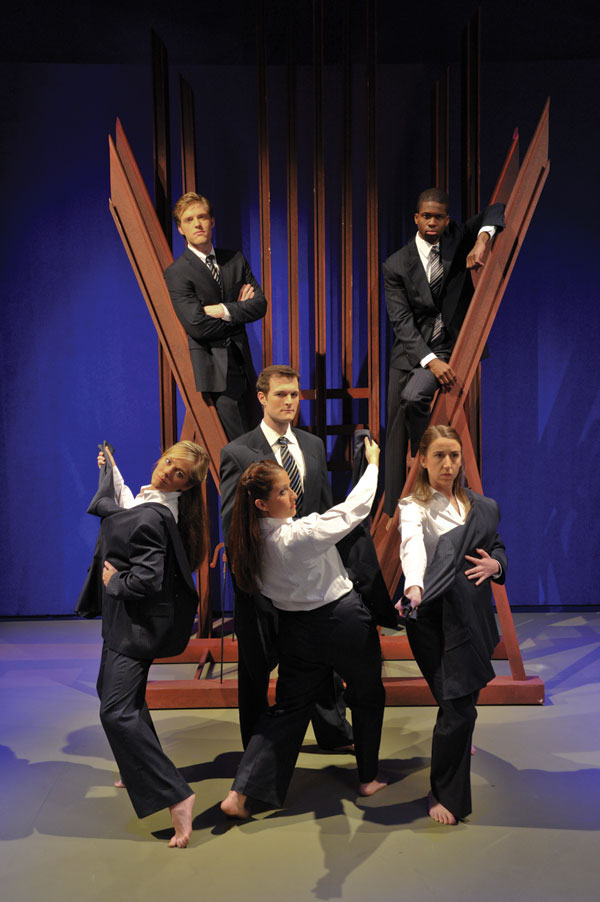Ginsberg & Glass team up for ‘Hydrogen Jukebox,’ the latest in FWO’s out-of-the-box operas
ARNOLD WAYNE JONES | Life+Style Editor
jones@dallasvoice.com
What do you get when you combine the Mobius-strip music of Phillip Glass with the vulgar, passionate lyricism of gay poet Allen Ginsberg? Believe it or not, you get an opera. Or an opera of sorts, at least.
Ever since converting to a festival format four years ago, the Fort Worth Opera has established a rep for doing edgy, unusual versions of that most august of theatrical forms: Opera. Yes, they have done grand operas in the classic vein (Carmen, Don Giovanni, Turandot), but they’ve also introduced world premieres and unheralded new works with complex, modern (often gay) themes: gay composer Tom Pasatieri’s dark Frau Margot, Jorge Martin’s challenging, frank adaptation of gay Cuban poet Reinaldo Arenas’ Before Night Falls; the reimagining of an opera based on Angels in America.
Up this time is perhaps the most unusually named opera in a while (Hydrogen Jukebox) composed by a master of minimalism and set to the granddaddy of the Beat Generation.
 This is not your father’s — or your grandfather’s — idea of opera. Or, for that matter, the director’s.
This is not your father’s — or your grandfather’s — idea of opera. Or, for that matter, the director’s.
“I never thought I’d direct a Philip Glass piece,” admits Lawrence Edelson, who is choreographing and directing Hydrogen Jukebox for his debut at the FWO. “They do not follow linear narrative arcs, and I personally tend to drift toward the more narrative type of opera as a director. As much as I’ve enjoyed his music, I never thought it was something I’d dive into. The conventional ideas about storytelling are put on hold.”
But Edelson was drawn to the piece, in part after meeting Glass.
“It was something quite unique — he’s an icon in American music,” Edelson says. “There’s usually not a tight relationship with the text [and his music], so what’s really fascinating about this work is, it’s Ginsberg’s poetry, and there’s a tremendous respect for the treatment of it.”
Setting the Howl author’s poems to music might seem like a foolish exercise, but actually, it’s a natural fit.
“Ginsberg really believed in the performative aspect of poetry, that poetry should live off the page,” Edelson says. And his poems, culled over 40 years for this opera, still speak to contemporary issues.
“Ginsberg’s poetry really spoke to me, and many of the issues he was struggling with in the ‘50s, ‘60 and ‘70s are among the same issues we still struggle with today,” says Darren Woods, general director of FWO.
“Ginsberg was a very out gay poet — his poems are about freedom from sexual repression and gay lib, and though this isn’t a gay piece per se, there are a couple of poems that” address those issues, Edelson says. “As a gay man, to be able to work off of material that has personal relevance, but I am not the same sort of gay man Ginsberg was! My life is not so colorful,” Edelson says. “Hydrogen Jukebox could be gayed up; I think that would be wrong. Ginsberg was not writing just for gay America, but for everybody.”
Interpreting poetry for the stage posed an interesting dilemma for Edelson: As a director, he’s accustomed to creating a specific reaction in an audience; poetry, however, is subject to multiple interpretations, none of which are wrong.
“My job [this time] is not to impose a specific interpretation but rather to set up an environment where the audience is able to take in the poetry in a way that’s meaningful for them,” he says. “All these things will inform the way you receive it.”
For out cast members Jonathan Blalock and Dan Kempson, the work has personal significance.
“I find it interesting that the portion of the opera that deals with a gay love story [“Green Automobile,” an elegy to Neal Cassady, with whom Ginsberg has a long-term affair] is presented as just one story,” Kempson says. “It speaks to a universality of love, not just presented as ‘We’re gay! Notice us!’ It’s as normal and as painful and as lovely and as beautiful as any love story.”
“I think it’s wonderful Fort Worth Opera is brave enough to attack off-the-beaten path operas, both musically and topically,” says Blalock, who also appeared in Before Night Falls. “It can be scary for a number of reasons, including financial, but the FWO has brought their audience along with them to the 21st century.”
Blalock was in the closet when he first met Kempson four years ago, so doing this production together has brought him full-circle in more than one way: “In this show, I kiss someone, but it’s a girl. It’s OK, though,” he says, “I’m a good actor.”
This article appeared in the Dallas Voice print edition May 20, 2011.















The content in this article is in sharp contrast to reporter Lopez’s frequent negative personal bias against DFW and Voice readers.
The audience appreciation for FWO and DO’s risk taking is not something to take lightly. Such audience appreciation is not a sure thing considering the news this week about the New York City Opera.